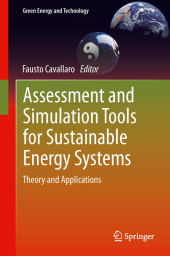 Neuerscheinungen 2015Stand: 2020-02-01 |
Schnellsuche
ISBN/Stichwort/Autor
|
Herderstraße 10
10625 Berlin
Tel.: 030 315 714 16
Fax 030 315 714 14
info@buchspektrum.de |

Fausto Cavallaro
Assessment and Simulation Tools for Sustainable Energy Systems
Theory and Applications
Herausgegeben von Cavallaro, Fausto
Softcover reprint of the original 1st ed. 2013. 2015. xxv, 427 S. 99 Tabellen. 235 mm
Verlag/Jahr: SPRINGER, BERLIN; SPRINGER, LONDON; SPRINGER 2015
ISBN: 1-447-15796-6 (1447157966)
Neue ISBN: 978-1-447-15796-0 (9781447157960)
Preis und Lieferzeit: Bitte klicken
This book covers both simulations using markal model and linear programming (LP) and methods and applications of multi-criteria, fuzzy-sets, algorithm genetics and neural nets (artificial intelligence) to energy systems.
In recent years, the concept of energy has been revised and a new model based on the principle of sustainability has become more and more pervasive. The appraisal of energy technologies and projects is complex and uncertain as the related decision making has to encompass environmental, technical, economic and social factors and information sources. The scientific procedure of assessment has a vital role as it can supply the right tools to evaluate the actual situation and make realistic forecasts of the effects and outcomes of any actions undertaken. Assessment and Simulation Tools for Sustainable Energy Systems offers reviews of the main assessment and simulation methods used for effective energy assessment.
Divided across three sections, Assessment and Simulation Tools for Sustainable Energy Systems develops the reader´s ability to select suitable tools to support decision making and implementation of sustainable energy projects. The first is dedicated to the analysis of theoretical foundations and applications of multi-criteria decision making. This is followed by chapters concentrating on the theory and practice of fuzzy inference, neural nets and algorithms genetics. Finally, simulation methods such as Monte Carlo analysis, mathematical programming and others are detailed.
This comprehensive illustration of these tools and their application makes Assessment and Simulation Tools for Sustainable Energy Systems a key guide for researchers, scientists, managers, politicians and industry professionals developing the field of sustainable energy systems. It may also prompt further advancements in soft computing and simulation issues for students and researchers.
Part I.- 1.Sustainability assessment of solar technologies based on linguistic information.- 2.Photovoltaic plants selection on an insular grid using multicriteria outranking tools: application in Corsica island (France).- 3.Assessment of Green Energy Alternatives Using Fuzzy ANP.- 4.Decision Criteria for Optimal Location of Solar Plants: Photovoltaic and Thermoelectric.- 5.A Multi-Attribute Model for Wind Farm location combining Cloud and Utility Theories.- 6.Territorial Design for Matching Green Energy Supply and Energy Consumption: The Case of Turkey.- 7.A cumulative belief degree approach for prioritization of energy sources: Case of Turkey.- 8.MCDA: Measuring robustness as a tool to address strategic wind farms issues.- 9.Assessment of Energy Efficiency Technologies: Case of Heat Pump Water Heaters.- Part II.- 10.A Fuzzy Paradigm for the Sustainability Evaluation of Energy Systems.- 11.Artificial Neural Networks and Genetic Algorithms for the Modelling, Simulation and Performance Prediction of Solar Energy Systems.- 12.Artificial Neural Network based methodologies for the estimation of wind speed.- 13.The use of Genetic Algorithms to solve the allocation problems in the Life Cycle Inventory.- 14.Design and implementation of maximum power point tracking algorithm using fuzzy logic and genetic algorithm.- 15.Chapter 15 Simulation and Renewable Energy Systems.- 16.Combining Mathematical Programming and Monte Carlo simulation to deal with uncertainty in energy project portfolio selection.- 17.Value Stream Maps for Industrial Energy Efficiency.- 18.Assessment of Energy Efficiency in Lean Transformation: A Simulation Based Improvement Methodology.- 19.Socio-Effective Value of Bio-Diesel Production.


